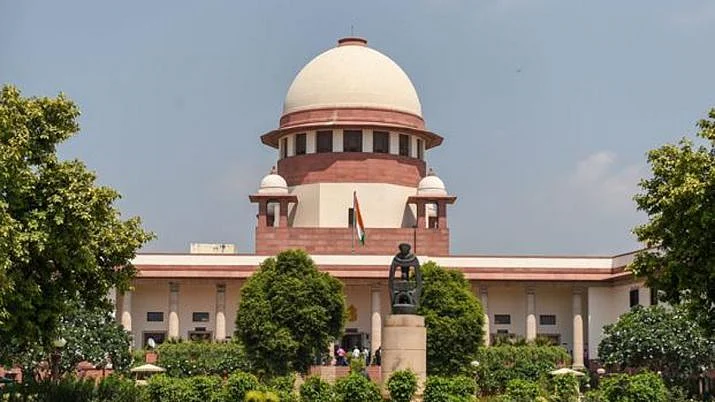Contempt plea over non-constitution of committee to review internet ban in J&K: SC seeks Centre’s response
The petitioners have contended that there is no information available in the public domain as regards setting up of the review committee, as was directed by the court earlier

The Supreme Court on Thursday sought the Central government's response in a plea seeking initiation of contempt proceedings against the authorities in relation to the suspension of internet services in Jammu & Kashmir. The court, however, refrained from issuing notice in the matter, legal news website BarandBench.com has reported.
The special three-judge Bench of Justices NV Ramana, R Subhash Reddy and BR Gavai was hearing a contempt petition filed by Foundation for Media Professionals (FMP) alleging the authorities' failure to constitute a Special Committee to review the ban on 4G internet in Jammu & Kashmir in accordance with an earlier order the Supreme Court.
Just as senior counsel Huzefa Ahmadi began to make submissions on behalf of the petitioner, the court at the outset told Attorney General for India KK Venugopal and Solicitor General Tushar Mehta that if decisions pertaining to the internet speed restrictions are taken by the designated committee, the same need to be placed in public domain.
"If you have complied with the orders given in May, then it is needed to be published in public domain," it said.
In the plea seeking initiation of contempt proceedings against the government, the petitioners have contended that there is no information available in the public domain as regards setting up of the review committee, as was directed by the court earlier.
However, SG Mehta told the Court that not only has the committee been set up, decisions have also been taken and reviewed.
Ahmadi sought to counter Mehta's submissions and argued that several orders for suspension of internet services in the region were passed between the May order of the Supreme Court was passed and the time of filing the instant plea. The concerned authorities are not responding to representations made by the aggrieved persons against internet suspension orders, Ahmadi added.
He said, "Our complaint is that they are not responding to representations being filed against suspension of services, and orders are not being published so how can one challenge it before a Court... The people of Jammu & Kashmir continue to suffer, medical facilities continue to suffer, children cannot take online classes. What the entire country enjoys, only this region cannot... this infringes upon their Article 21 rights."
AG KK Venugopal, however, said that the question of contempt does not arise, as the committee in question has already been set up."How can there be contempt if committee has already been put in place?" he said.
The Bench was quick to point out that the details of the committee were not in the public domain, and asked the government to file its counter affidavit on the plea.
Despite Ahmadi's request for issuance of notice in the plea, the court refused to do so. Instead, it granted a week's time to the government to file its counter.
In its May 11 judgment, the Supreme Court had directed that a "Special Committee" be constituted to "immediately" to determine the necessity of continued restriction of mobile internet speeds in Jammu & Kashmir to 2G only.
The petitioners have stated that no information regarding the formation of the committee is in the public domain and that the government must explain its stand on non-compliance with the apex court order.
While declining to order restoration of 4G services in Jammu & Kashmir, the court had then said that a "Special Committee", which is separate from the Review Committee prescribed under the Temporary Telecom Suspension Rules 2017, was necessary having regard to the seriousness of the matter.
After the Supreme Court verdict of May 11, the Jammu & Kashmir administration extended the internet curbs thrice – on May 27, June 17 and July 8 – citing the threat of cross-border terrorism. The administration also claimed that 2G internet speed has not caused any impediment to COVID-19 control steps, online education or e-commerce.
The internet suspension in J&K was put in place from August 5 in the wake of the abrogation of Article 370.
The Central government had imposed a complete communications blackout in the erstwhile state of J&K in August 2019, right after abrogation of Article 370. Five months later in January 2020, on the basis of a Supreme Court order, the services were partially restored, only at 2G speed for mobile users. Access was provided only to a selected "white-listed" sites, and social media was completely blocked.
Follow us on: Facebook, Twitter, Google News, Instagram
Join our official telegram channel (@nationalherald) and stay updated with the latest headlines